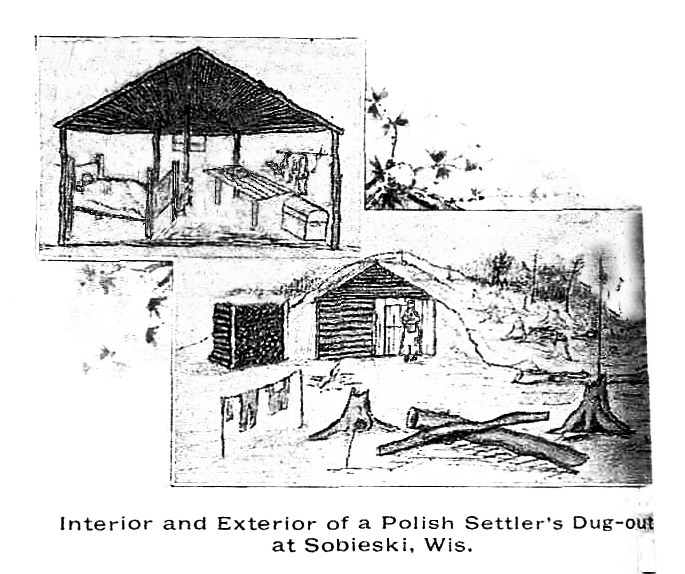SOBIESKIThe following gives a detailed, first hand account of the Polish people who settled in Oconto County in the later 1800's. Coming from a homeland that had known foreign occupation and poverty for centruies, these people somehow managed to immigrate to North America and start a new life of freedom. Hard work was not a problem; it was the only life they knew well in order to survive. Owning land, having a homestead, and learning to read and write were great achievements in and of themselves. Many were the first in their entire line of ancestry to achieve this status. The following report was written by Reverand Francis Wlaslowski (Laslow in English), a Catholic Priest who was raised in the Polish homeland, studied in Europe while working as a laborer to meet his expenses, and came with his people to serve them in America. He spoke and wrote fluiently in his adopted English language, also in German and French, beside being one of the few educated Poles it immigrate. His great passion for these settlers, and for his religious calling, is understandable, even in this modern day and age, and should be taken in context of that late 1800's time. RITA from "The Catholic Church In Wisconsin" 1898 Here, also, as in the rest of the congregations attended from Flintville
(note:
in Brown County - the main parish at this time for the Oconto County missions
of Chase, Sobieski, Brookside and Spruce), the
Poles constitute the larger element. They are as a class
a thrifty and industrious people, showing marked respect for the authority
of the Church and devotion to its institutions. It would not,
therefore, be surprising, although their number at present is quite limited,
should they at no distant time establish in this vicinity one of the most
substantial and influential Catholic centers within the diocese.
At present these people are very poor, and many of them are compelled to be satisfied with a dugout for a dwelling. The interior of these wretched places is no more inviting than is their external appearance, a bench and table, made of the , roughest kind of lumber, an old wooden traveling chest and a rude bed, constituting, in many instances, the entire furniture possessed. The struggle made by these people to obtain a foothold is sometimes a protracted and arduous one, as upon arriving at their location, they have but little, if any, money to do with. In some instances, and they are by no means of rare occurrence, the head of the family buys forty acres of land for $300 or $400, one-eighth or one-tenth of which, or even less, is all the money he possesses. In this condition he undertakes to clear the land, build a home, support a family and pay interest and principal on the investment. A few succeed in effecting their purpose, but there are many who fail, it often being the case that, after years of effort upon their part, they are compelled to yield up their interest in the property and, seek an opportunity elsewhere, to begin life over again. Such surroundings and conditions are certainly no sinecure for the poor settler, no matter how stolid a disposition he may possess, nor are they overwhelmingly inviting to the one who is sent among these people to administer to their spiritual necessities; not that they are unwilling or indifferent, but rather that it is absolutely impossible for them to do for the cause of religion that which is oftimes required of them. Once established in his new home, however, the immigrant begins life in earnest and faces its various problems with a fortitude that deserves a more propitious fate than that with which it is generally rewarded. If money is limited and he is compelled to buy on time, prices are commensurately exorbitant; and there are so many things that he must need have — a wagon, a cow, poultry and numerous implements — all of which, of course, he can obtain, for in every settlement are to be found men both willing and anxious to extend credit for these purposes; but the price that he is compelled to pay virtually makes of him a slave for many years to come, and, in fact, he is lucky if he manages to escape from their clutches at all. As to the necessaries of life, why, such are generally obtained in abundance from the little garden patch, a sort of dernier resort, when all other means of obtaining sustenance have failed. The smaller tools used about the place are generally made by the farmer, and are naturally of the crudest, while he, in many instances, besides attending to his numerous other duties, converts himself into a clothier, shoemaker and hatter for the entire family. But, amid all of these discomforts, these people adhere to the teachings of the Church, and with really sublime confidence struggle along in the firm belief that affairs will ultimately turn out for the good. The foregoing gives but a brief and unsatisfactory idea of the original condition of many of the settlements throughout the Northwest, and it is from the knowledge born of experience that the pastor of the parish at Fliiitville and adjoining missions, whose people are fast nearing a stage of comfort and independence, expressed it as his opinion that this settlement will at no distant date become one of the strong Catholic centers of the diocese. ABOUT THE AUTHOR |
